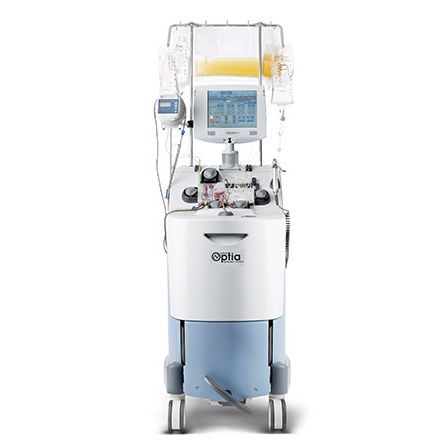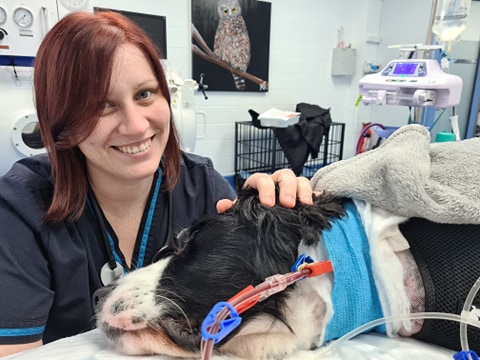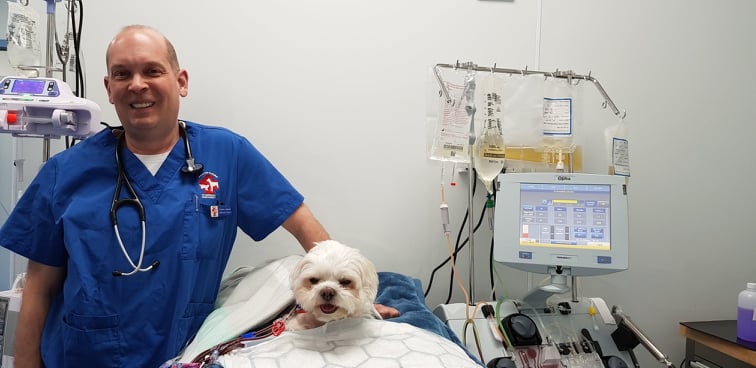Therapeutic Apheresis

North Shore Veterinary Emergency and Critical Care Centre is proud to present Therapeutic Apheresis for your pet!
- Therapeutic Apheresis is a breakthrough in the fight against serious autoimmune diseases.
- It removes pathologic substances and is the FIRST LINE treatment for severe IMHA (Immune Mediated Haemolytic Anaemia)
Veterinary Excellence
What is Therapeutic Apheresis?

Therapeutic Apheresis is a process of selectively removing blood components (plasma, RBCs, WBCs and platelets) from continuously flowing blood by centrifugation.
Therapeutic Plasma Exchange (TPE) is the procedure to remove pathologic substances (generally pathologic antibodies and exogenous toxins) from patients with immune-mediated or autoimmune diseases, drug overdosage or poisoning.
Plasma Adsorption selectively removes exogenous poisons, drugs or endogenous substances (cytokines, cholesterol), which are not removable by haemodialysis.
Leukapheresis selectively removes abnormal RBCs and malignant leukocytes. Alternatively, healthy components of the buffy coat (platelets, lymphocytes, stem cells, granulocytes) are harvested for selective processing and re-infused for immunotherapy or transplantation.
Your pet's apheresis procedure

WHAT TO EXPECT: A qualified veterinary surgeon and nursing team in TPE are responsible for operating and monitoring your pet throughout the procedure.
CONNECT: Under sedation, a central intravenous catheter is connected to your pet’s vein via their jugular for the procedure.
PROCEDURE AND PATIENT CARE:
A small portion of your pet’s blood is removed and mixed with a fluid that prevents the blood from clotting. Most of your pet’s plasma is separated and removed from the other parts of their blood. The remaining parts of your pet’s blood are mixed with the new replacement plasma and then returned to your pet. After the procedure, your pet is awakened, monitored and given cage rest to aid their recovery.
Indications for Therapeutic Plasma Exchange (TPE)
- Neuromuscular Diseases
- Myasthenia Gravis
- Polyradiculoneuritis
- Acute polymyositis
Metabolic Diseases
- Acute hepatic failure
- Hyperlipidemia
Hematologic Diseases
- Immune-mediated hemolytic anemia
- Immune-mediated thrombocytopenia
- Hyperviscosity syndrome
- Hyperleukocytosis (leukemia)
- Polycythemia
- Pure red cell aplasia (anti-EPO antibodies)
- Neonatal isoerythrolysis
- Red blood cell exchange
Kidney Diseases
- Systemic lupus
- Lepto-associated pulmonary hemorrhage
- Antibody mediated glomerulonephritis
Miscellaneous
- Drug overdosage
- Exogenous toxin removal
- Polyarthritis
- Pemphigus foliaceus
- Myasthenia Gravis
Immune-mediated hemolytic anemia
Therapeutic plasma exchange at (NSVECC) North Shore Veterinary Emergency and Critical Care
Immune-mediated haemolytic anaemia (IMHA) is a condition where the body’s immune system attacks and destroys its own red blood cells (Erythrocytes), thus leading to severe anaemia, an unhealthy yellow colouring of the tissues called jaundice or icterus as well as an assortment of life-threatening complications.
In essence, this means that your pet’s immune system, which typically fights of invaders and infections, is now fighting your pet’s own red blood cells. This results in the red blood cells being destroyed, causing anaemia as well as inflammation resulting in damage around your pet’s whole body.
In most of cases the cause or trigger point of this immune reaction is not known. During the acute episode of IMHA reactive antibodies are showing up in large numbers of the patients’ blood system and attaching themselves to the surface to the Erythrocytes.
This leads to “clumping” (agglutination) of the red blood cells before they are being destroyed. Immunosuppressants such as Prednisolone, Azathioprine, Cyclosporine and Mycophenolate are used to control the immune reaction. Unfortunately, the downregulation of the immune reaction can take several days to weeks.
Plasma apheresis, also called Therapeutic Plasma Exchange (TPE) allows us to rapidly remove the offending antibodies alongside with waste products (e.g.Bilirubin) from the patient. This procedure, albeit not curative, buys time for the immunomodulators to work.
Based on the same principle, Therapeutic Plasma Exchange is also very effective in the treatment of severe Immune Mediated Thrombocytopenia (IMT), a condition frequently encountered in animals suffering from IMHA.
Blood products used in our Apheresis procedures are sourced from specific pathogen free donors of the New Zealand Companion Animal Blood Bank (NZCABB).

Pre treatment

Post Treatment
Effects of a single (3-hour) TPE treatment to correct severe in-saline agglutination in a dog with IMHA, Immunie-mediated hemolytic anemia.
Therapeutic Plasma Exchange should be considered as a FIRST LINE treatment for severe IMHA.
